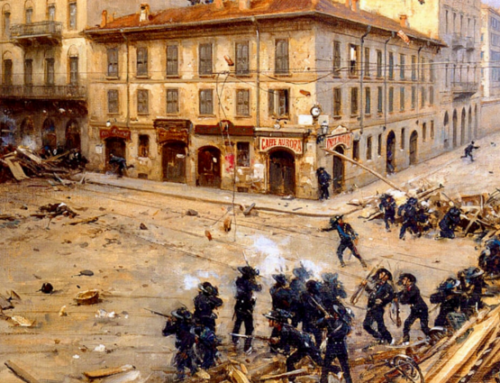As Owen Barfield understood in his Oxford senior thesis (“Poetic Diction”), all men and women of good will who reject the objectification and deconstruction.
As always, your leadership—intellectual, moral, and creative—is essential to the survival of the conservative movement for the next generation. Thank you for organizing this.
As you know, I’m traversing the West with the Family Birzer. So much of what you’ve already published deserves comment, but I’m ready to collapse after hiking in badlands, plains, and mountains; chasing five kids through playgrounds, grasslands, swimming pools, forests, and parking lots; and driving across 2/5 of the United States. So, I will limit my comments.
First, I don’t think “libertarianism is a false friend” as posted in the essay republished by you, reposting Clint, reposting Esolen. Libertarians have been, and, in my humble view, will continue to be, the brethren of any thriving conservatism. At the moment, one of the (not the only) greatest problems is the massive growth of the state—from creeping socialism to leaping socialism. And, we’ve leapt into a mess, a mess that makes the timid liberalism of Clinton seems downright agreeable. Well, not really, but hopefully my point has been made. As demonstrated so clearly in his short but deadly time as president, Obama has proven himself the successor not of Humphrey, Carter, and Clinton, but of Wilson, FDR, and LBJ. We are in dangerous and perilous times. The libertarians so readily remind the conservatives of the glories of the individual (no matter how fallen) and the dangers of collectivism. Are there still disagreements between conservatives and libertarians? Of course. But, no more so than between serious Roman Catholics and serious Reformed Christians.
Second, and very much related to the first point, we MUST form alliances, pan-Right alliances, anti-bureaucratic alliances, humane alliances. As Owen Barfield wrote in 1940: “I mean the impression it gives of a sober effort to build up and maintain a common stock of thought rather than to startle with a series of sparkling individual contributions—like a commonwealth of the spirit, in which there is no copyright.” [Barfield, “Effective Approach to Social Change,” Christian News-Letter, July 24, 1940]
Third, imagination is absolutely critical to ANY non-ideological and humane way of life. As you know, one of my favorite books is Barfield’s Poetic Diction (1928). In it, he wrote: men “do not invent those mysterious relations between separate external objects, and between objects and feelings, which it is the function of poetry to reveal.” Instead, Barfield continued, “These relations exist independently, not indeed of Thought, but of any individual thinker.” (Poetic Diction, pg. 72)
Further, men “in the development of consciousness, have lost the power to see this one as one. Our sophistication, like Odin’s, has cost us an eye; and now it is the language of poets, in so far as they create true metaphors, which must restore this unity conceptually, after it has been lost from perception. Thus, the ‘before-unapprehended’ relationship of which Shelley spoke, are in a sense ‘forgotten’ relationships. For though they were never yet apprehended, they were at one time seen. And imagination can see them again” (Poetic Diction, pp. 72-72).
As Barfield understood in his Oxford senior thesis (Poetic Diction), all men and women of good will who reject the objectification and deconstruction of the human person; the collectivism of governments, schools, and bureaucracies; and the deadening and dampening illness of our conformist culture MUST reclaim what is rightfully ours, given to us by God and nature—our natural order, our desires for stabile and orderly community, justice, love, and charity.
Yours, under a Montana sky,
Brad
The Imaginative Conservative applies the principle of appreciation to the discussion of culture and politics—we approach dialogue with magnanimity rather than with mere civility. Will you help us remain a refreshing oasis in the increasingly contentious arena of modern discourse? Please consider donating now.
The featured image is courtesy of Pixabay.








Leave A Comment